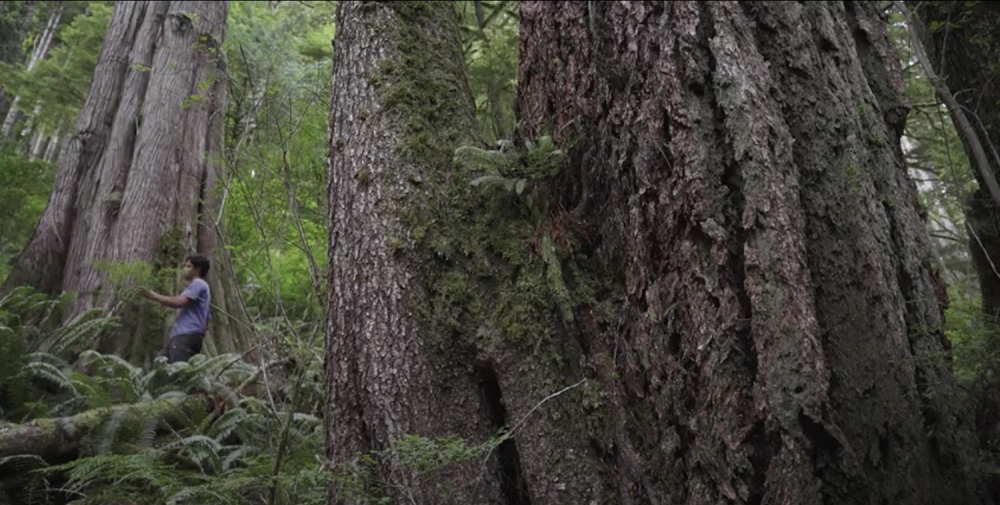
Above photo: Old-growth forest in the Fairy Creek Valley.
Two weeks into a campaign to halt logging of ancient rainforests in the last intact watershed of the San Juan River system, activists have set up a third blockade on unceded Pacheedaht Territory.
In the midst of an ongoing climate emergency, logging of the ancient rainforests continues at an unfettered rate. The amount of old-growth forest logged each day on Vancouver Island is equivalent to 32 soccer pitches according to the Wilderness Committee. These forests are not only vital for carbon sequestration, but also fundamental for the integrity of complex, interconnected ecosystems that support keystone and culturally significant species, such as salmon. Alarmingly, less than one percent of largest stature forest was found to be remaining on the Island according to the scientific report BC’s Old Growth Forest: A Last Stand for Biodiversity recently authored by Dr Rachel Holt, Dr Karen Price and David Daust. And most of that is going at an accelerating rate on Vancouver Island, with an estimate of three years remaining before it is all gone, except the meagre areas that have been protected.
Grassroots forest defenders from across Vancouver Island have prevented Teal Jones Group from blasting logging roads into the headwaters of the Fairy Creek watershed for the past two weeks. The road would have penetrated the last remaining intact, unlogged tributary in the entire San Juan River system. The tributary is near Port Renfrew on unceded Pacheedaht territory.
Last Sunday, August 23, saw a second blockade established east of the Fairy Creek watershed. A third blockade was set up August 24 on a logging road on Edinburgh Mountain (also unceded Pacheedaht Territory).
With the exception of Eden Grove on Edinburgh Mountain, contiguous old-growth corridors have been severed between the rich valley bottom and the protected upper reaches. The infamous Big Lonely Doug stands in stark contrast to the clear cut it stands in on Edinburgh, the sole remaining giant fir in the cut. Big Lonely Doug has become an internationally recognized symbol for BC’s devastating logging practices. Just up the mountain, logging is ongoing. This is what the newest blockade will stop.
Zoe Cilliers, a forest defender at the blockade, says, “If we pick and choose where our actions line up with our words, our words don’t mean anything. I’m an ecologist; I work with kids, I teach them about old growth, I teach them the value of these ecosystems. Being here means keeping a promise. If I don’t stand for this, how can I stand behind what I say to these kids?”
K.L, also at the blockade, states, “Anyone who wonders why people are blockading, they should go and spend some time in an old growth forest, and they will understand. It’s the mosses, the spongy floor, the smell, it’s the stillness, the spaciousness.”
In April 2020, the BC government finalized its commissioned review on the current state of Vancouver Island’s remaining old-growth forests. The report has not yet been released to the public by the Minister of Forests, Lands, Natural Resource Operations and Rural Development who may sit on the report until October for reasons not understood, given the crisis in our forests. Meanwhile, old-growth logging persists; roads are blasted into pristine mountains; massive, ancient trees are falling. Time is of the essence. As protester J.C. says, “Once it’s gone, it’s gone for good. It’s short-sighted to be logging like this.”
Gary Merkel, one of two Old Growth Strategic Review commissioners, said in an interview with the Narwhal, last January: “We’re managing ecosystems—that are in some cases thousands of years old—on a four-year political cycle. The management systems change from government to government.”
The demands for the Province from the forest defenders at the frontline of the Fairy Creek blockades are the following:
(1) Immediately release the recommendations of the Old Growth Strategic Review, which have not been made public since the panel submitted its report in April 2020.
(2) The immediate and permanent end of all old-growth logging in BC.
(3) Work with sovereign First Nations to implement a comprehensive plan for a sustainable and restorative second-growth forestry model.
Saul Arbess has been a forest activist since the late 1980s on southern Vancouver island and a retired professor of anthropology. Josh Wright is a forest activist maintaining a watching brief on old growth destruction across the Pacific Northwest.
Learn more: https://www.youtube.com/embed/kBnhktwJIo4
Related posts:
Views: 0
 RSS Feed
RSS Feed

















 September 2nd, 2020
September 2nd, 2020  Awake Goy
Awake Goy  Posted in
Posted in  Tags:
Tags: 
















